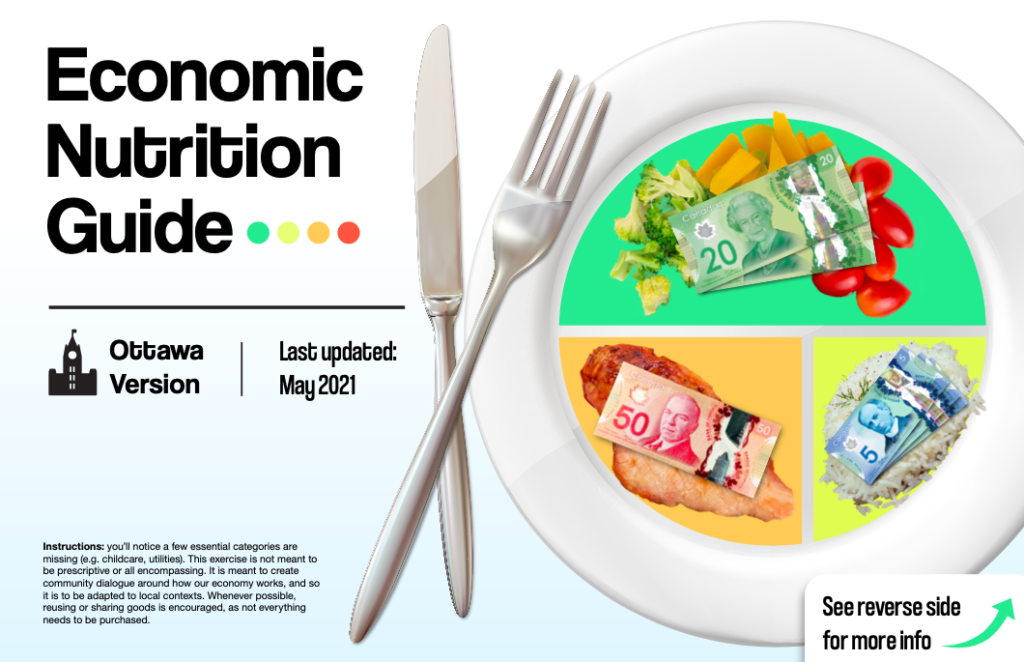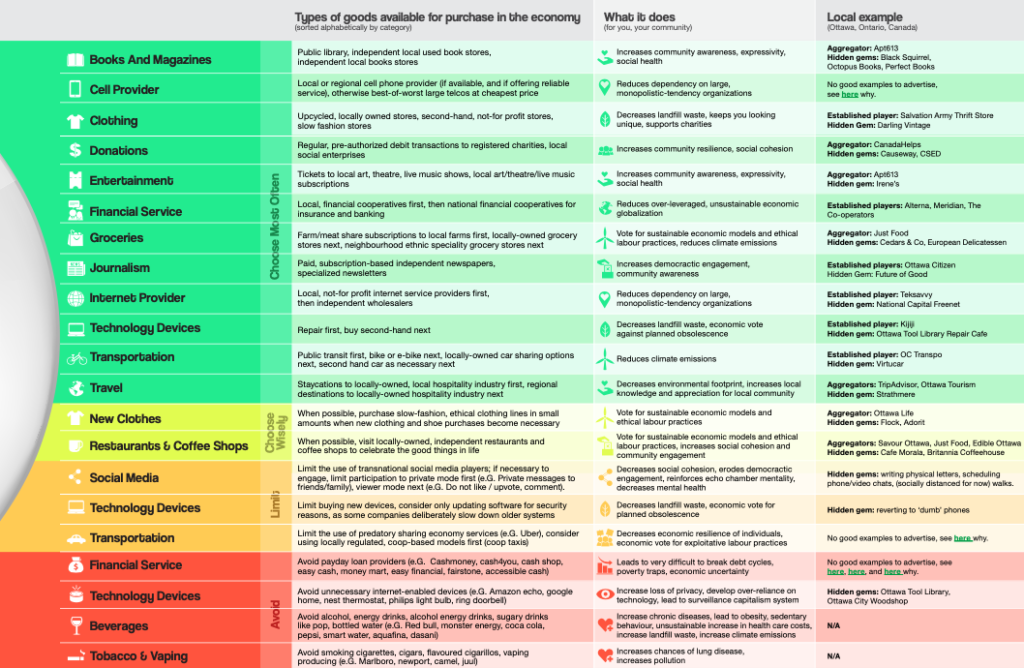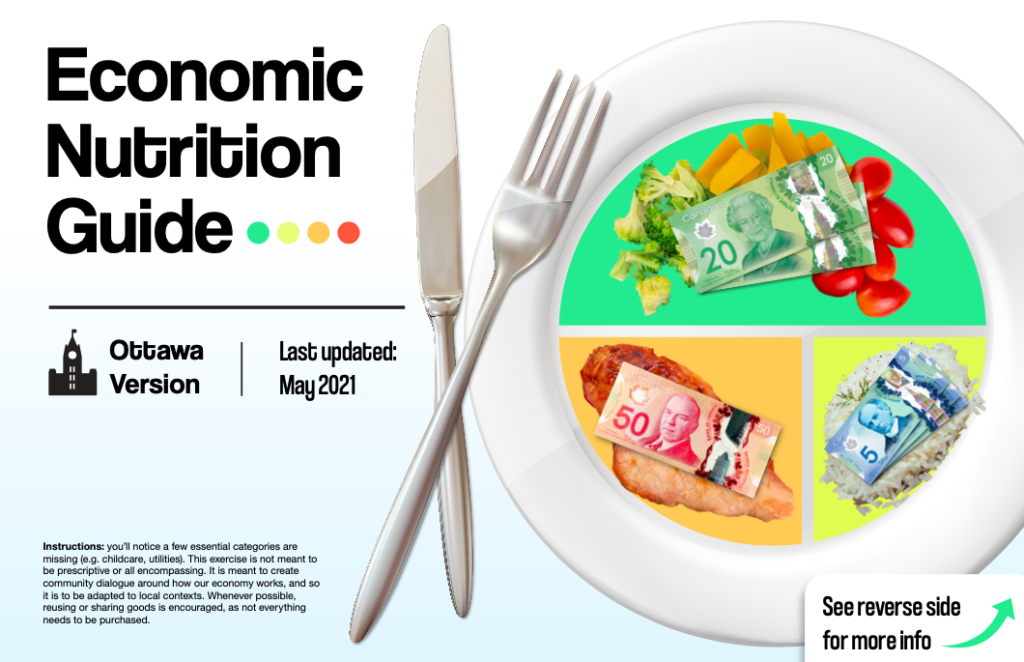First draft (for discussion), Ottawa version. Download high res version.
Presentation to Financial Literacy Action Network Ottawa (FLANO) (download presentation material as .pdf) (September 2021).
Validation workshop #1 – Algonquin College Client Relations Business class (January 2022).
Collaboration with Rideau Rockcliffe Community Resource Centre (RRCRC) workshop on Rideau-Rockcliffe ward-specific economic nutrition guide (February 2023) (details about this workshop).
Resources:
Economic nutrition guide – workshop facilitator’s guide (download as .pdf) (April 2023)
Economic nutrition guide – workshop worksheet (download as .pdf) (April 2023)
For a more fulsome writeup on the concept, see the article below (or download as .pdf).
Press to date about this project:
SiriusXM satellite radio show Moolala: Money Made Simple – Economic nutrition guide (aired February 2022)
Councillor Rawlson King’s Rideau Rockcliffe newsletter (February 2023)




// Introducing economic nutrition guides, a local resource showing the link between individual responsibility and collective impact
From terrible working conditions for their workers, to macro-level studies showing that the presence of Amazon warehouses causes wage depression in those geographic areas over time (despite local politicians’ efforts to vie for Amazon businesses in mini global races for the bottom simply because job creation is job creation, everything else be damned), we have a growing mountain of research showing the ill effects of relying on this particular place to fulfill our instant shopping cravings.
The latest thing to shock me about Amazon came last June 2021, when an ITV investigative journalism story showed Amazon warehouses in the UK destroying millions of goods that didn’t get sold, since it’s cheaper to crush them and throw them out rather than do literally anything else with them.
It got me thinking about other purchases I make where the impact at the community level is perhaps more in a moral grey area, or more difficult to tell.
Should I encourage my family members to purchase a new phone when their old one stops working as well as it used to? Rather than telling them all about planned obsolescence (Apple admitted to the practice, and continues to be fined and sued for it), can I suggest alternatives that might result in different (better?) outcomes?
It’s this last question that made me put together what I’m calling an economic nutrition guide.
It is inspired by the chart you can get at a doctor’s office telling you about food choices: And how you can have a bunch of apples since they’re good for you, but you should limit your intake of margarine, since it has saturated fats that can harm your system. That not everyone can afford fresh apples is also important to keep in mind, as you’ll see from the columns, sometimes our systems simply do not offer alternatives when constraints are introduced.
This idea of action and effect is what made me add a column into the guide that tries to spell out in plain language the potential impact of various types of purchases on a system – in this case the system being an ecosystem: your community.
Showing folks the link between their individual actions and the resulting community impact can be eye opening, particularly as I think we often want to do the right thing, but we can only know so much about so many things.
Just as I happen to know enough about phones to know that replacing their batteries rather than throwing them into the landfill altogether is a preferable practice given environmental and labour practice concerns related to manufacturing cell phones, others might be able to help me figure out what to do when I want to support a charity but I don’t know which types of organizations have the best impact. Or when I want to invest responsibly but don’t know where to start.
We are all overwhelmed by choices we can make, and we are being sent contradictory signals since its Comms101 for everyone and everything to have an angle and a backstory (do X; stop doing Y; Z is now longer in; did you know that A is now bad for B new reason nobody knew about until now?).
We are genuinely confused, and often at sufficient scale that we even have terms for it: whitewashing, greenwashing, and related ones such as virtue signaling, when we think we’ve figured out what we should do but struggle with the humble bragging about it.
And while ethical certifications do exist to help guide us, they tend to focus on single issue items. For example, environmental practices, or labour conditions for select products like coffee or chocolate. Some organizations have started down the path of making linkages between their products and their impact (for instance, Fogo Island Inn’s economic nutrition label being particularly relevant). That said, most not-for-profit or public institutions focus on macro-level indicators (e.g. Sustainable Development Goals) rather than the collective impact of our individual actions.
The economic nutrition guide acts as a micro-macro impact bridge. And its development started in a very personal way, from my own categories of things I keep track of as part of my family’s budgeting practices. Categories like groceries, entertainment, travel but also more mundane things like internet providers and media platform spending.
I’ve tried to think of my best advice in the areas where I make purchases, as well as come up with a list of local examples that I think should be supported. And if the best thing is not an option for you, hopefully the next best thing is possible, and so on.
I felt I could fill out the guide for Ottawa since I’ve lived here for over a decade. In that time I’ve slowly amassed knowledge about what I consider hidden gems in town, as well as practices or organizations that are tucked away but do a lot of good.
Many don’t have big advertising budgets and so stay small, but it doesn’t mean they’re not precious to our ecosystem. Just like we protect vulnerable plants and species at risk, I believe we should protect these groups that create positive community impact for all of us.
Covid-19 has shown that many of these organizations lack the buffers larger corporations have, or an ability to fend for themselves through lobbying or innovative accounting practices.
I invite you to build your own economic nutrition guide, for yourself as an individual or for your community, whatever that looks like, from family to chosen family, to communities you belong to or professional associations. What would the economic nutrition guide of emerging artists in Ottawa look like?
In the process, my hope is that you’ll clarify the values you hold dear, since you are, just like we all are, continually voting with your wallet every time you make a purchase.
Together, through “the wisdom of the crowd”, throwback to what crowdsourcing was first called when it appeared as a practice, may you also find out about hidden gems in your community, as well as about things that we haven’t solved for collectively.
To me, that has been the trickiest part to digest (since we’re taking nutrition): when I was filling out my version of the guide and couldn’t come up with any viable alternatives for categories that typically have negative impacts at the community level.
For example, the fact that we still don’t have solutions for those of us forced to rely on payday loan providers, quite clearly spells out our collective failure. I don’t pretend to think people who use payday loans services don’t understand what is happening; it’s just that we have normalized those injustices, often calling them ‘specialized financial products’ or even ‘innovation’, when we’ve truly wanted to add insult to injury.
You can download a blank slate template of the economic nutrition guide here.
I look forward to seeing filled out examples not only from various other communities across Canada, but also for specific groups of people.
I’ll be working on a facilitator’s guide to accompany the resource, so look for that in the coming months.
If you have feedback or want to workshop the guide in a particular context, please let me know – I’d love to hear about examples and help out if I can.
I believe the resulting conversations from running economic nutrition guide development sessions might bring about better financial literacy, stronger civic and democratic engagement, as well as a renewed sense that any system can be deconstructed and re-made better again.